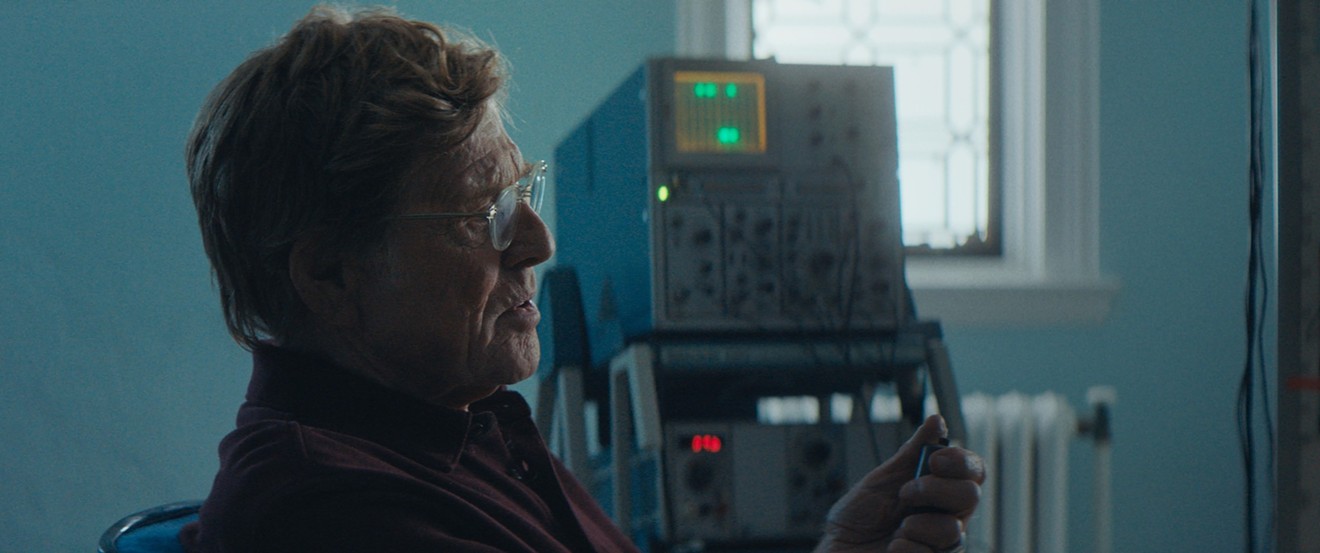The premise for Charlie McDowell’s The Discovery is so simple and poetic that it’s hard to believe it hasn’t been done before: A scientist discovers definitive proof of an afterlife, and the world responds with mass suicides. McDowell, who scored a sleeper hit with The One I Love — which tells the sci-fi story of a couple who rents a country home to repair their relationship only to find that they have sinister doubles hiding in the guesthouse — doesn’t rely on special effects for his speculative fictions. Instead, the director focuses on people and how we do or do not adapt to absurd situations or revelatory technology. And in that way, The Discovery is a fresh take on the theme of well-meaning scientists meddling with nature. But while the film is ambitious, with enough intrigue and uneasy moral quandaries to keep my attention rapt in the end it just doesn’t make the leap to the other side.
The opening is a shock to the system: Thomas (Robert Redford), the man who has proven that after we’ve died the spirit goes to another plane of existence, has gone into hiding as people try to “get there.” The global suicide toll has hit 4 million; news reports trumpet public self-inflicted deaths, like two cheerleaders who off themselves on the 10-yard line during an NFL game. The world wants to see him, so Thomas has at last consented to an interview. If he thought it would go breezily, he’s wrong; a gleeful producer steps in front of the camera, thanks Thomas for his discovery, and then puts a bullet through his own skull. Here, only 10 minutes in, Robert Redford reminds us why he’s a legend. His face flushes in an instant from arrogant doctor to trembling child, a transition McDowell captures in extreme close-up.
Later, Thomas’ sons Will (Jason Segel) and Toby (Jesse Plemons) drive from the ferry, where Will’s just arrived, to their father’s secluded estate. Will’s shaken from an encounter he had with a wise-cracking woman, Isla, an earnest and erratic Rooney Mara, who seems to stir a memory in him. But he’s also nervous to see his father — Will is adamantly against suicide and believes his father didn’t think through the consequences of presenting his discovery to the world. As the two are driving, McDowell subtly builds this world: Through the car window, we can see two different funerals taking place in the dreary background. McDowell understands he doesn’t have to show big-budget set pieces to sell this sci-fi premise.
On the estate, nobody seems to know they’re in a cult. Folks who’ve tried and failed to commit suicide hang out there in matching orange jumpsuits like they’re waiting for the next Hale-Bopp comet, and the only thing keeping them alive is Thomas’ insistence that they make use of themselves on Earth. Redford is at once gentle and terrifying as their leader, often pushing the “guests” to their emotional limits to prove their devotion to the cause. It’s difficult to parse if Thomas is really for or against on suicide, and that ambivalence stirs tension in his scenes — will he just tell everyone to end it all?
Plemons also completely dissolves into his character, a burly, nonconfrontational guy who seems like he’d rather be growing weed in Humboldt County than helping his dad develop a secret machine that will record what’s happening in the brain after death.
Segel, however, can’t quite keep up with his co-stars, his anger and intensity glaringly on the nose. His deficiencies become a problem when the story twists into a kind of detective tale about Will trying to track down clues that will help him understand what his dad’s machine is really recording. The bigger problem: We know before Will does. McDowell masterfully hid his story’s twists in The One I Love but doesn’t pull it off here.
Support Us
Houston's independent source of
local news and culture
account
- Welcome,
Insider - Login
- My Account
- My Newsletters
- Contribute
- Contact Us
- Sign out
In The Discovery, Robert Redford Finds Heaven, So Everyone Starts Killing Themselves
April Wolfe March 29, 2017 8:00AM

That undiscovered country? He discovered it.
Courtesy Netflix.
[
{
"name": "Related Stories / Support Us Combo",
"component": "11591218",
"insertPoint": "4",
"requiredCountToDisplay": "4"
},{
"name": "Air - Billboard - Inline Content",
"component": "11591214",
"insertPoint": "2/3",
"requiredCountToDisplay": "7"
},{
"name": "R1 - Beta - Mobile Only",
"component": "12287027",
"insertPoint": "8",
"requiredCountToDisplay": "8"
},{
"name": "Air - MediumRectangle - Inline Content - Mobile Display Size 2",
"component": "11591215",
"insertPoint": "12",
"requiredCountToDisplay": "12"
},{
"name": "Air - MediumRectangle - Inline Content - Mobile Display Size 2",
"component": "11591215",
"insertPoint": "4th",
"startingPoint": "16",
"requiredCountToDisplay": "12"
}
,{
"name": "RevContent - In Article",
"component": "12527128",
"insertPoint": "3/5",
"requiredCountToDisplay": "5"
}
]
KEEP THE HOUSTON PRESS FREE...
Since we started the Houston Press, it has been defined as the free, independent voice of Houston, and we'd like to keep it that way. With local media under siege, it's more important than ever for us to rally support behind funding our local journalism. You can help by participating in our "I Support" program, allowing us to keep offering readers access to our incisive coverage of local news, food and culture with no paywalls.
Trending Film
- International Film Festival 2000
- It’s Sadly Kind of Perfect That New Season of GLOW Is Stolen by Marc Maron
- Made in Houston
-
Sponsored Content From: [%sponsoredBy%]
[%title%]

Don't Miss Out
SIGN UP for the latest
news, free stuff and more!
Become a member to support the independent voice of Houston
and help keep the future of the Houston Press FREE
Use of this website constitutes acceptance of our
terms of use,
our cookies policy, and our
privacy policy
The Houston Press may earn a portion of sales from products & services purchased through links on our site from our
affiliate partners.
©2024
Houston Press, LP. All rights reserved.




